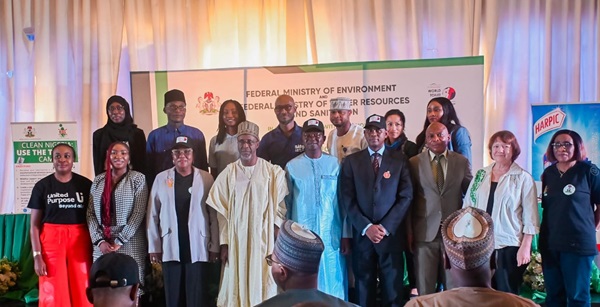
The Federal Government, in partnership with the Federal Ministry of Environment and the Federal Ministry of Water Resources and Sanitation, has restated its unwavering commitment to making Nigeria open defecation-free by 2030.
The announcement was made during the World Toilet Day (WTD) event held in Abuja, themed “Accelerating Change”.
At the event, the Minister of Environment, Malam Balarabe Abbas emphasised the importance of personal responsibility in improving toilet and sanitation systems in Nigeria. He urged individuals to consider the inclusion of toilet plans in all building designs, emphasising the need for proximity.
Against the backdrop of the theme “Accelerating Change,” Abbas highlighted the urgency for a public campaign aimed at fostering behaviour change for positive action. With just seven years left to achieve Sustainable Development Goal 6 (SDG 6) on safe toilets and water for all by 2030, Nigeria is currently off track. The minister expressed concern about the current situation, with over 4 billion people worldwide living without safe toilets and 48 million Nigerians still practising open defecation.
Abbas revealed the alarming reality of many Nigerians resorting to using the bush and water bodies for excreta disposal, while institutions, where available, often lack functional sanitary facilities. The absence of sewerage systems in most urban areas poses a significant challenge, leading to water bodies becoming repositories for sewage and wastewater.
He underscored the severe consequences of poor excreta and sewage disposal, citing the high rate of diarrhoea diseases as the second leading cause of morbidity and mortality among children under the age of five. Abbas stressed the need for massive investment and innovation in the sanitation sector, citing the positive impact on public health and the economy.
“Investment in the sanitation sector is good for public health and the economy. For instance, every one Naira invested in toilets and sanitation returns up to five Naira in saved medical costs, better health, increased productivity, education, and jobs,” he stated.
Abbas declared that the Federal Ministry of Environment would no longer treat issues of open defecation as business as usual. The ministry will deploy its regulatory framework to ensure the adequate enforcement of sanitation laws across the country.
He highlighted several actions taken by the Federal Government to address sanitation challenges, including the declaration of a state of emergency on water, sanitation and hygiene, as well as the signing of Executive Order no. 009 on a Nigeria that is free from open defecation by 2025. Additionally, the revision and validation of the 2005 National Environmental Sanitation Policy have been undertaken and the minister plans to present the revised policy to the Federal Executive Council for approval.
Abbas acknowledged the community-based intervention in the control of open defecation and the clean and green programmes of the Federal Ministry of Environment. He called on the Federal Ministry of Education and environmental health officers/sanitary inspectors at all levels of government to carry out advocacy and intensify routine sanitary inspections.
Addressing the issue of inadequate sanitary facilities in Federal Government unity schools, Abbas highlighted challenges such as locked toilets, poor water supply, and defective septic tanks. He called on stakeholders, partners, NGOs, CSOs, the organized private sector, community leaders and everyone to promote good sanitation and hygiene practices for overall environmental health protection.
In his address, the Minister of Water Resources and Sanitation, Prof. Joseph Utsev marked the fourth anniversary of the ‘Clean Nigeria: Use the Toilet’ Campaign. He revealed that poor sanitation costs Nigeria an estimated N455 billion annually, translating to $3 billion in losses. Open defecation alone accounts for a third of this amount.
Utsev stressed the economic impact of open defecation, linked to sanitation-related diseases that hinder socio-economic development and exacerbate poverty. Access to water, sanitation and hygiene (WASH) are basic human rights critical to the socio-economic development of any nation.
Nigeria’s commitment to the Sustainable Development Goals (SDG) includes achieving access to adequate and equitable sanitation and hygiene for all by 2030, paying special attention to the needs of women and girls and those in vulnerable situations.
The Federal Government pledges to engage all stakeholders, harmonise actions, and end open defecation while improving sustainable and climate-resilient access to sanitation services in Nigeria.
Mr. Charles Ikeah, representing the office of the permanent secretary, Federal Ministry of Environment, highlighted the high rate of diarrhoea diseases as a consequence of poor excreta and sewage disposal. The representative of the private sector and brand Harpic, Cassandra Uzougo, emphasised the need for collective efforts to improve water and toilet hygiene in Nigeria.

